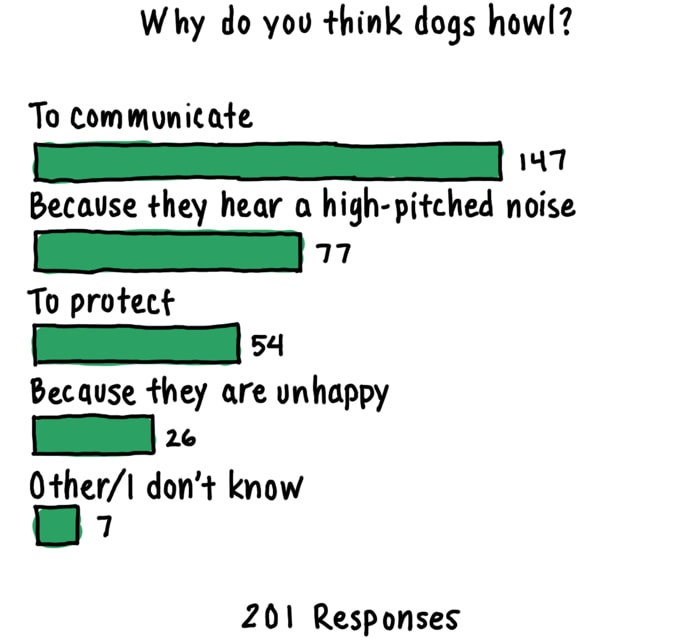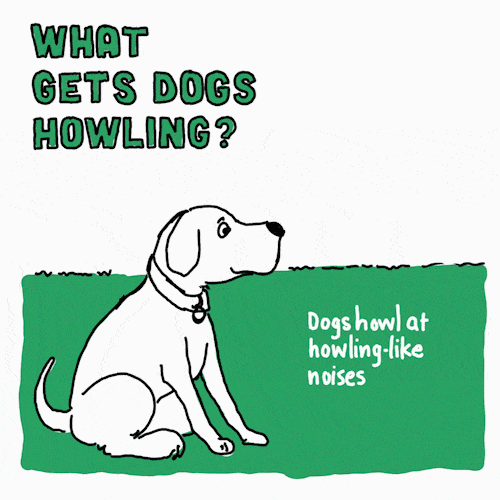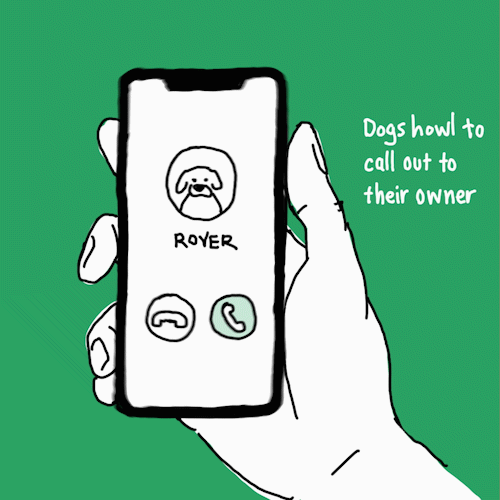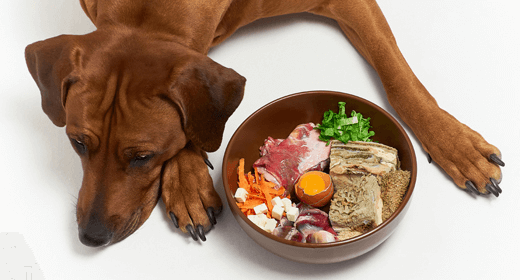

Every pet parent wants to know the meaning of dog howling. Now, we all know what howling sounds like - it’s a high-pitched sound that sounds like a doleful cry. However, many of us are still quite unaware of why do dogs howl. Well, here’s a fun fact: howling for dogs is genetic inheritance. It’s no news that dogs are closely related to wolves. Despite the difference in their sizes, wolves and dogs share around 99% DNA. However, heredity is not the only reason why dogs howl. So, what does it mean when a dog howls, and how can you handle your howling dog? You will find answers to such questions in this article.
To handle a howling dog, you first need to understand the reason why your pet is making this long, wailing noise. Here’s a look at some probable causes of dog howling.
Dogs feel stimulated by high-pitched sounds. Howling is their way of responding to fireworks, sirens, bells, and other noises. This type of howling starts as soon as they hear the shrill sound. As a pet owner, you don’t have to worry about this type of howling since it usually stops when the trigger sound does.
If a dog is excessively attached to you, they might experience separation anxiety. So, once your little companion learns that you won’t be around for a few days, they might start howling under stress and anxiety. If your dog howls every time you need to leave for a long period, it is a sign of hyper-attachment. You might have to treat their anxiety to manage this type of howling. And no, scolding them is not the right way of doing it.
A howling dog could also be seeking attention. And this type of dog howling can be bothersome. You might feel like scolding, questioning, or holding your furball, but you must do the exact opposite of it. Avoid giving your pet any type of attention. Don’t pamper or scold them.
Dogs can sense bad weather, earthquakes, diseases, and so much more. Hence, you cannot rule out the fact that a howling dog could also be trying to alert you of something. Maybe they feel a situation is not right for you or could cause you potential harm. Dogs can sense the intentions of a person through their facial expressions. That’s exactly why dogs howl at some people who try to get near you or your house.
Dogs are still very social animals; it’s just that now we are their pack. When they miss us, they will howl in hopes we respond. Dr. James Serpell, BSc, Ph.D., Professor of Humane Ethics & Animal Welfare at the University of Pennsylvania School of Veterinary Medicine, explains it this way: That [howling] is an attempt on the part of the dog to ask the owner, ‘Where are you so that I can rejoin you?’
Dr. James Serpell doesn’t believe so. “My own research has shown that it is common across breeds. People think huskies may be more prone to group howling.”
Dogs going through separation anxiety may howl excessively when left home alone. Dr. Jo Gale, BVetMed CertLAS MRCVS, Senior Manager for Global Science Advocacy at Waltham Petcare Science Institute, says, “If you reinforce quiet behavior, they are less likely to continue howling.” You can do this by quieting your dog and then leaving for a very brief time before returning and rewarding them when they stay quiet. Gradually increase the time you’re gone to reassure them you’ll always be back.
But what if your pawsome pet is howling due to other reasons? Let’s understand how to handle such situations:
As a pet parent, you must avoid reacting to the howling. This could encourage your dog to howl even more. If you avoid reacting, your dog will understand that howling won’t get their demands met. This might possibly work towards reducing this behaviour in the future.
Pamper your little companion when they do not howl on hearing a siren or bell. Give them attention and love when they are calm to encourage quiet behaviour. Always keep your pet’s favourite treats ready so you can let them know they have been a good boy or good girl by not howling.
If your pooch often reacts to high-pitched sounds, you can even get in touch with a dog trainer. They can work with your dog to change their response to triggering sounds like sirens and fireworks.
Note: Training your fur baby is a time-consuming process. Hence, stay consistent with the actions recommended above and your pet will learn to control their howling triggers.
If you're looking for the perfect dog for you, try our Dog Breed Selector today and enjoy a lifetime of tail-wagging joy.
To understand what a howling dog means to communicate, you need to first read the situation. When dogs howl, it could mean anything–a response to high-pitched sounds, an attempt to attract attention, a suspicion towards someone, etc.
Yes. Since dogs are genetically programmed to howl, it is okay to leave them alone when they do that. However, if it bothers your neighbours, you might want to learn to handle your fur baby or get professional help.
While howling sounds like a long cry, it doesn’t always mean that they are sad.
To stop your dog’s howling, you can reward their calm and quiet behaviour. If they are howling for attention, avoid reacting to it. If you need more help, you may want to reach out to a dog trainer.





A balanced diet with high-quality protein is essential for your dog's optimal wellness.
Author: Dr. Saza Curaming
Dogs are semi-carnivores. They can be nourished by protein from animal sources, plant sources or a combination of both. Although dogs are often fed a plant-based diet, they are not herbivores.
The difference between animal-based protein and plant-based protein sources is that animal-based ones incorporate chicken, lamb, fish meal, and beef while plant-based protein sources include corn-gluten and soybean meal.
Similar to their carnivorous ancestors–wolves, coyotes, foxes, and jackals, the body structure of dogs is optimized for eating meat which is relatively easier for them to digest than a plant-based diet.
Even though dogs are semi-carnivores, it is important to not leave out animal-based proteins from their diet. Feeding our dogs meat-based products are closely related to their natural ancestral diet. There are three main reasons animal-based proteins are better suited for our furry friends than plant-based proteins.
Including protein in your pet dog’s diet serves several functions. For one, a high-quality protein food for dogs can provide amino acids. Amino acids play a key part in building hair, skin, nails, muscles, tendons, ligaments, and cartilage. Protein plays a key role in hormone and enzyme production.
Amino acids are building blocks and are considered critical to our furry best friend. Different studies have shown that out of the 20 amino acids, 10 of these are called non-essential and can be made by your dog when they need it.
A dog’s need for amino acids will also change depending on age and condition. As dogs age, their body composition and muscle-specific proteins decline and for that reason, giving them protein in their meal helps them maintain a healthy body throughout the years.
That said, it goes without saying that puppies require sufficient protein for growth. According to a study, a puppy's diet should consist of at least 22% protein. For an adult dog, 18% of protein should be incorporated into their everyday meal.
Animal protein sources contain an average of 35% higher protein concentration. It contains higher doses of calcium, phosphorus, omega 6, methionine, cystine, and taurine.
While protein can be derived from plants, the canine digestive system typically has an easier time utilizing animal-sourced protein. Our dog's gastrointestinal tract is not designed to digest large amounts of plant-based products.
To deliver a healthy balance of amino acids to support your dog's health and vitality, IAMS created a recipe that uses chicken as their number one ingredient and aids in maintaining healthy digestion, immune system, skin and coat, and even provides dental care support that is developed with veterinarians.
Ready to achieve your dog’s optimal health with an animal-based protein food? For more information about IAMS Dog, visit https://iams.asia/my/. IAMS Dog is available at all leading supermarkets and grocery stores nationwide.